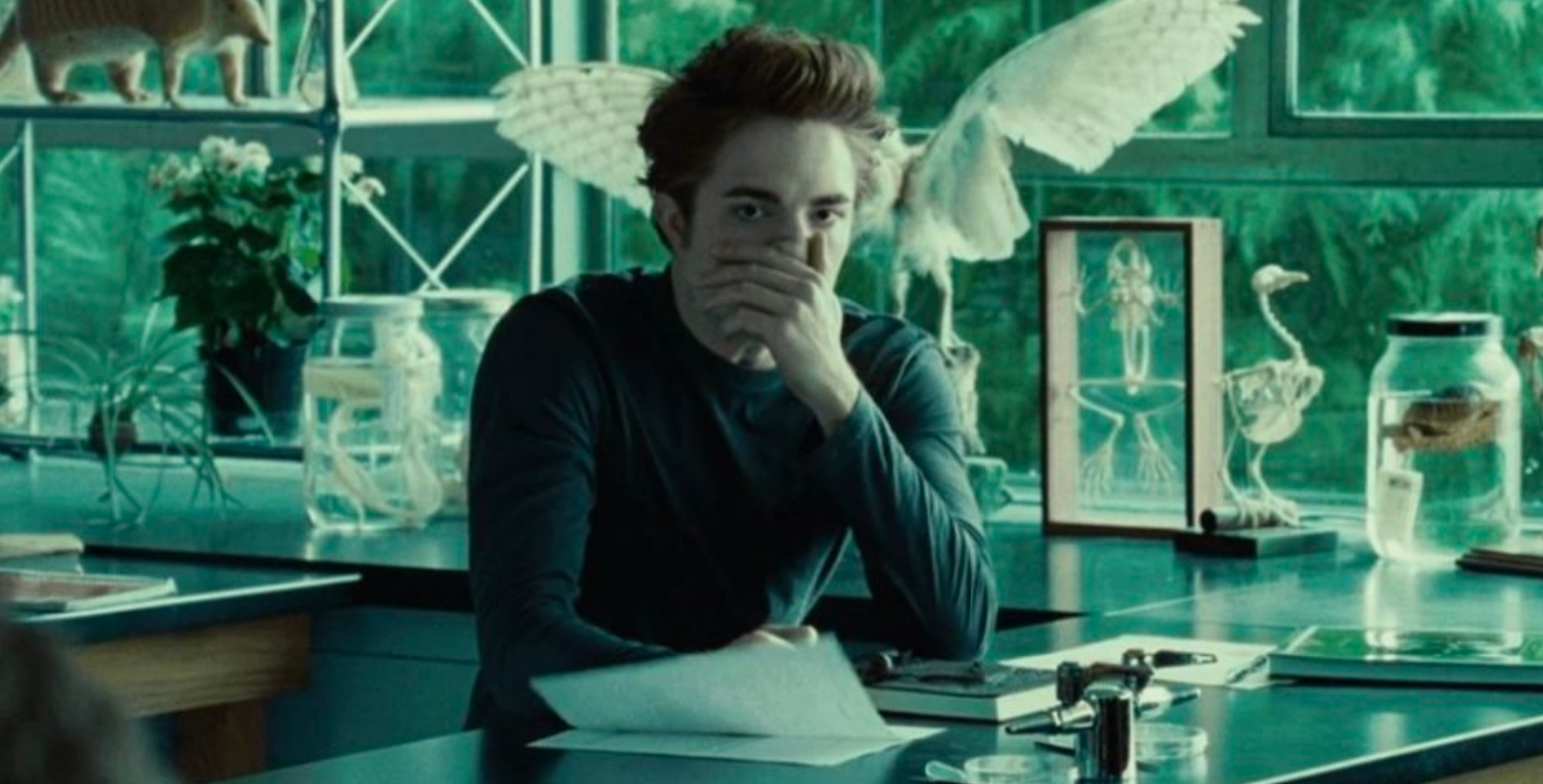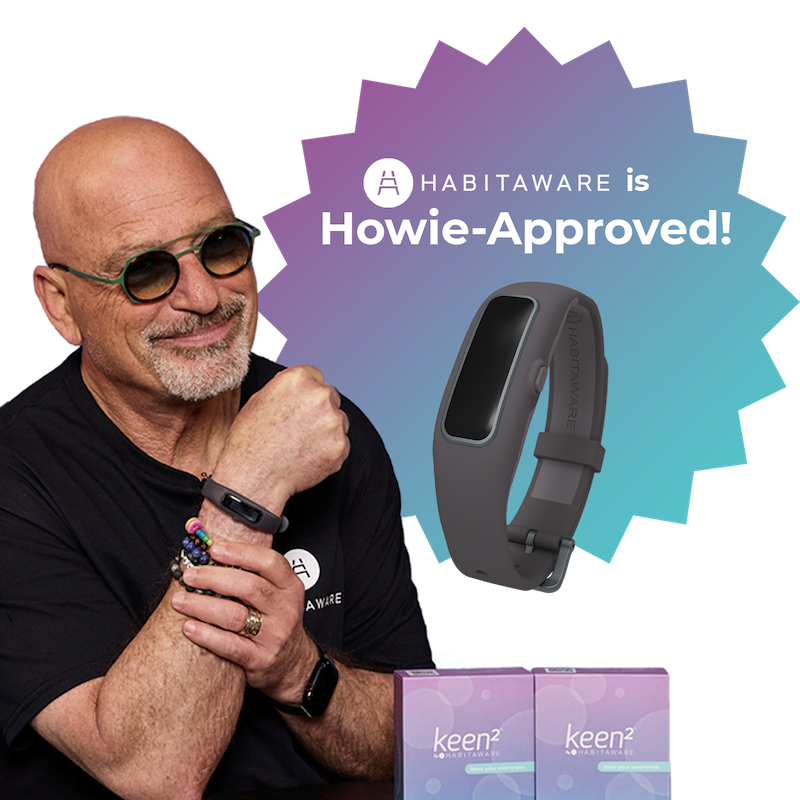Having a body-focused repetitive behavior (BFRB), you probably are all-too familiar with how strong the urge to pull your hair, bite your nails, or pick your skin is. That's because, for people with BFRBs like trichotillomania (hair pulling), dermatillomania (skin picking), or onychophagia (nail biting), these urges comes from the subconscious nervous system, and for many of us they're so strong that it feels like nothing else matters in the moment.
So, let's set the stage. You’re in biology class, it’s an average Wednesday. You’re trying to focus on your work, but all of a sudden, it hits you. It washes over your body and can only be satisfied by one thing: but if you do it, the damage will be done, and you’ll regret it.

In this analogy, you aren’t Bella. You’re Edward.
If you take any offense to being compared to a vampire, we get it. Know that we are not trying to call people with BFRBs vampires, but we are going to use Edward’s vampire urges and how he handles them as a tool to think about how we manage our own urges in our body.
The reason that BFRB urges are so hard to fight off is that they don’t just stop if we ignore them. An analogy that we at HabitAware like to give is comparing your BFRB urges to hunger. You can’t just ask someone to stop being hungry, it’s your body sending you hunger pings (a signal!) that it has a need. Your BFRB is like this too. A BFRB urge doesn’t come from your stomach, though, it comes from your sympathetic nervous system, and is a signal that your body is feeling over or under-stimulated. This could be bored, stressed, nervous, sad, or it could even be things that we associate as “good” like relaxation or excitement. Your body wants to even itself out, even if it’s experiencing a happy emotion.
For our purposes, keep this in mind. Your BFRB urge is a signal from your body that it wants to calm itself down, and it’s using your BFRB as a tool to do just that! Think of it like “white noise,” but instead of it being for your sense of hearing, it’s for your sense of touch. For people with BFRBs, these behaviors are our brain’s most effective tool at re-balancing our nervous systems.
For Edward, the urge that we are comparing to here is his hunger. The thing that best satiates Edward’s hunger is human blood because he is, indeed, a vampire. Here’s the conflict: Edward doesn’t want to drink human blood, because he doesn’t want the consequences of it. He doesn’t want to hurt anyone. While his stakes seem a little bit more dramatic, it’s pretty comparable to body-focused repetitive behaviors. We don’t want to do our behaviors because we don’t want the consequences of them! The bald spots, the scabs, the infections, the bitten-down nails, and especially the shame and regret. Even though we don’t want any of these things, the urge can be so strong in the moment that we simply can’t resist.
The way that Edward curbs these urges to keep his cool around his biggest trigger (Bella) is through finding a substitute way to meet that urge, and planning accordingly.

He’s a “vegetarian” vampire. He drinks the blood of deer, cougars, and other wildlife out around Washington. It doesn’t taste as good as human blood, and he has to take time to go into the woods and hunt so that he can manage his hunger (his urges).
From the book, he says: “It’s like a human only living on tofu. It keeps you strong, but you’re never fully satisfied.”
This is significant to BFRB management because Edward is saying that he is sacrificing the satisfaction of doing his unwanted behavior to prioritize what matters more to him: not eating people. For us, the equivalent is saying “I know that pulling my hair, picking my skin, or biting my nails would be more satisfying, but I can do other things to meet the urge, too.”
And you can do other things. There are other ways to self-soothe and regulate your sympathetic nervous system. Deep breathing, stretching, taking a walk, doing yoga, the list is endless. That’s what makes our problem a little bit more complicated than Edward’s!
For humans, and for vampires, hunger is very cut and dry. You’re hungry? Well, the answer is eat food! For body-focused repetitive behaviors, it’s not quite so simple.
First, you have to identify what your BFRB urge is telling you.
Is it saying that you’re tired, stressed, over-excited, or what? Once you take a moment to answer that question, remind yourself that you are not an immortal vampire. You are a human, and your human body has needs. You deserve to take care of yourself and meet those needs!
So if you’re tired, take a nap! Try to get a better sleep schedule implemented in your routine. Maybe start some nighttime yoga.
If you’re stressed, take a deep breath. Maybe step back from whatever you’re doing and take a quick break. Make tea, grab some water. If stress is an ongoing problem, maybe try to look at how much you are doing in a day and budget in some time for self-care, or ask someone for support with your responsibilities.
If you’re excited or energized, shake it out! Have a dance party, do some stretching, or try to zen out with some yoga or meditation.
If you’re bored or trying to focus, can you take a break? Can you grab a fidget toy? Can you keep a water bottle next to you to sip on?
Once you can identify why your body is asking you to self-soothe, and then summon the strength to choose an alternative self-soothing activity that might not feel as good, but will be “good enough,” then you can start to make massive improvements!
Unlike vampires, our eyes don’t change color when we’re experiencing our unwanted urges. Sometimes, BFRB urges are sneaky and we need a little bit of a nudge to take care of ourselves. If you want a tool in your BFRB management, try Keen2. Keen2 is a smart watch that subtly vibrates when you do your behavior, acting as your “self-care” alarm and prompting you to ask yourself what it is you need in the moment. Then, you can reach for a replacement self-soothing strategy.
One thing that motivates Edward to continue to keep managing his vampire urges, is his family. Since they are all going through the same difficulties that being a vampire brings, they help keep each other accountable and motivated, and understand each other’s problems very deeply. If you are in need a “coven” like Edward has, a group of people who get it, look no further than the BFRB Change Collective! The BFRB Change Collective is an online community that is run by HabitAware Peer Coaches, people who have learned to manage their BFRB, and is full of people on the journey to management. It isn’t a support group, it’s a growth group, because if you participate in the weekly challenges, check-ins, and zoom meetings, you will make progress and feel a lot better about your BFRB!
Want another BFRB-movie comparison? Check out our blog about Disney's Frozen!


